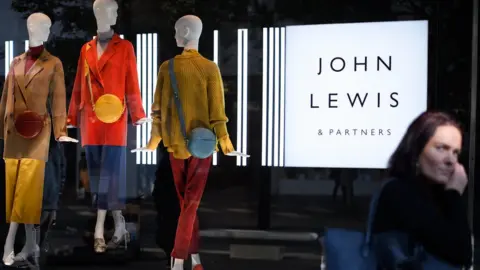Is 'Never knowingly undersold' killing John Lewis?
 Getty Images
Getty ImagesThe latest big fall in profits at John Lewis has thrown the spotlight on to its famous price promise - to be "Never knowingly undersold".
Competition in retailing has never been fiercer and matching rivals' prices has cut profits to the bone at the business.
Boss Charlie Mayfield says although times like these test the real integrity of that promise, it is extremely valuable and he has no intention of backtracking on it.
But some analysts argue it is too hard to live up to and it is time to ditch it.
What does the slogan actually mean?
The meaning of the phrase remains the same as when it was first coined.
As the company explained it at the time, "If you can buy more cheaply elsewhere anything you have just bought from us, we will refund the difference."
A John Lewis spokesperson said that nowadays, "we will match the price of the same product with any of our High Street competitors".
The spokesperson added: "We have a team who pro-actively check the prices of our competitors. If they have a discount or promotion, we will apply the same discount or promotion."
Additionally, if a member of the public finds a product sold more cheaply elsewhere, "we will match that price".
However, this price match only applies to the High Street - not to online-only retailers such as Amazon.
In any case, there has long been a suspicion that in the 21st Century, the public at large doesn't fully understand the slogan.
As far back as 2003, an internet poll of 1,000 shoppers carried out by UK Net Guide found that only 57% of people appreciated its true meaning.
In fact, 21% thought it meant the exact opposite - that the store never deliberately undercut its competitors.
Price v service
The High Street is going through a period of unusual turmoil at present, with changing shopping habits posing a threat to traditional shops.
The internet has allowed the emergence of purely digital retailers, chiefly Amazon, which can deliver goods direct to people's doors without the expense of running "bricks-and-mortar" stores.
As a result, many of John Lewis's rivals are literally fighting for survival and are prepared to slash their margins in an effort to keep trading.
Analysts point out that John Lewis has never been purely about price-cutting and could probably jettison the phrase without any undue ill-effects.
In the words of Sofie Willmott, senior retail analyst at GlobalData: "Considering the devastating impact that delivering its brand strapline 'Never Knowingly Undersold' has had on profits in H1 2018-19, it is no wonder John Lewis & Partners rebranded last week, stepping up its new strategy to shift the focus away from price and on to service."
Another analyst, Steve Dresser of Grocery Insight, is blunter: "The business feels like it's broken. Never knowingly undersold needs refining, badly."
Can John Lewis afford the pledge?
The chairman, Sir Charlie Mayfield, is still firmly wedded to the idea, calling it "the most comprehensive price promise in the market".
"Times like these test the real integrity of that promise," he says.
A John Lewis spokesperson was even more adamant, saying: "It's at the heart of everything we do. It's a big part of the trust in the brand and it means a lot to our customers. It's not going anywhere."
John Lewis has other strengths, of course. Even though it won't commit to matching Amazon's prices, it was swift to recognise the importance of online shopping, which now accounts for more than 40% of its sales.
It also has a less extensive network of physical outlets to support than most of its competitors. There are 50 stores throughout England, Scotland and Wales, including 12 "At Home" stores.
Still, the discounting policies of other beleaguered retailers make their prices hard to match.
John Lewis's strong appeal to the moneyed middle-classes and reputation for customer service mean that it has never competed solely on price, so it could perhaps change tack without difficulty.
On the other hand, it would be losing something that in many ways sums up its whole ethos - and in a ferociously competitive world, retailers can ill afford to erode their distinctiveness.
